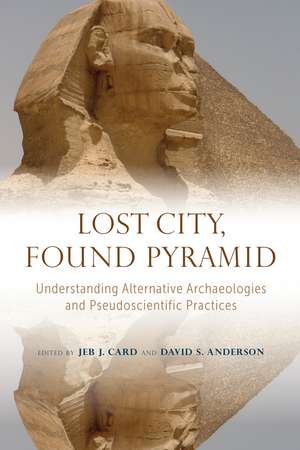Lost City, Found Pyramid: Understanding Alternative Archaeologies and Pseudoscientific Practices
Editat de Jeb J. Card, David S. Anderson Contribuţii de Terry Barnhart, Christopher Begley, April M. Beisaw, James S. Bielo, Deborah A. Bolnick, Stacy Dunn, Kenneth L. Feder, Denis Gojak, Bradley T. Lepper, Evan A. Parker, Tera C. Pruitten Limba Engleză Paperback – 15 iun 2025
Highly recommended." —CHOICE
Lost City, Found Pyramid delves into the fascinating world of sensational “pseudoarchaeology,” from perennial discoveries of lost pyramids or civilizations to contemporary ghost-hunting and reality TV. It examines how nonscientific pursuit of myths and legends warps both public perceptions of archaeology and of human history itself.
A collection of twelve engaging and insightful essays, Lost City, Found Pyramid does far more than argue for the simple debunking of false archaeology. Rather, it brings into focus the value of understanding how and why pseudoarchaeology captures the public imagination. By comprehending pseudoarchaeology’s appeal as a media product, cultural practice, and communication strategy, archaeologists can enhance and enliven how they communicate about real archaeology in the classroom and in the public arena.
The first part of Lost City, Found Pyramid provides numerous case studies. Some examine the work of well-intentioned romantics who project onto actual archaeological data whimsical interpretative frameworks or quixotic “proofs” that confirm legends, such as that of the Lost White City of Honduras, or other alternative claims. Other case studies lay bare how false claims may inadvertently lead to the perpetuation of ethnic stereotypes, economic exploitation, political adventurism, and a misunderstanding of science.
Offering much of interest to scholars and students of archaeology, archaeology buffs, as well as policy-makers involved in the discovery, curation, and care of archaeological sites and relics, Lost City, Found Pyramid provides an invaluable corrective and hopeful strategy for engaging the public’s curiosity with the compelling world of archaeological discovery.
Lost City, Found Pyramid delves into the fascinating world of sensational “pseudoarchaeology,” from perennial discoveries of lost pyramids or civilizations to contemporary ghost-hunting and reality TV. It examines how nonscientific pursuit of myths and legends warps both public perceptions of archaeology and of human history itself.
A collection of twelve engaging and insightful essays, Lost City, Found Pyramid does far more than argue for the simple debunking of false archaeology. Rather, it brings into focus the value of understanding how and why pseudoarchaeology captures the public imagination. By comprehending pseudoarchaeology’s appeal as a media product, cultural practice, and communication strategy, archaeologists can enhance and enliven how they communicate about real archaeology in the classroom and in the public arena.
The first part of Lost City, Found Pyramid provides numerous case studies. Some examine the work of well-intentioned romantics who project onto actual archaeological data whimsical interpretative frameworks or quixotic “proofs” that confirm legends, such as that of the Lost White City of Honduras, or other alternative claims. Other case studies lay bare how false claims may inadvertently lead to the perpetuation of ethnic stereotypes, economic exploitation, political adventurism, and a misunderstanding of science.
Offering much of interest to scholars and students of archaeology, archaeology buffs, as well as policy-makers involved in the discovery, curation, and care of archaeological sites and relics, Lost City, Found Pyramid provides an invaluable corrective and hopeful strategy for engaging the public’s curiosity with the compelling world of archaeological discovery.
Preț: 192.83 lei
Nou
Puncte Express: 289
Preț estimativ în valută:
36.90€ • 38.60$ • 30.65£
36.90€ • 38.60$ • 30.65£
Carte nepublicată încă
Doresc să fiu notificat când acest titlu va fi disponibil:
Se trimite...
Preluare comenzi: 021 569.72.76
Specificații
ISBN-13: 9780817362232
ISBN-10: 0817362231
Pagini: 272
Ilustrații: 29 B&W illustrations, including 2 maps - 4 tables
Dimensiuni: 152 x 229 mm
Greutate: 0.45 kg
Ediția:First Edition
Editura: University Of Alabama Press
Colecția University Alabama Press
ISBN-10: 0817362231
Pagini: 272
Ilustrații: 29 B&W illustrations, including 2 maps - 4 tables
Dimensiuni: 152 x 229 mm
Greutate: 0.45 kg
Ediția:First Edition
Editura: University Of Alabama Press
Colecția University Alabama Press
Notă biografică
Jeb J. Card is a visiting assistant professor of anthropology at Miami University in Ohio. He is the editor of The Archaeology of Hybrid Material Culture.
David S. Anderson is a visiting assistant professor of anthropology at Roanoke College and the coeditor of Constructing Legacies of Mesoamerica: Archaeological Practices and the Politics of Heritage in and beyond Mexico.
David S. Anderson is a visiting assistant professor of anthropology at Roanoke College and the coeditor of Constructing Legacies of Mesoamerica: Archaeological Practices and the Politics of Heritage in and beyond Mexico.
Recenzii
"These case studies help readers understand the motivations and methods of alternative archaeologists. . . . They argue that scholars must respond to pseudoarchaeology and pseudoscience both reactively and proactively. Excellent bibliography. Summing Up: Highly recommended." —CHOICE
"Lost City, Found Pyramid is a strong contribution that I hope will encourage more professionals to get off the bench and use their expertise, communication skills, and platforms to do some good."
—American Antiquity
"Lost City, Found Pyramid is a strong contribution that I hope will encourage more professionals to get off the bench and use their expertise, communication skills, and platforms to do some good."
—American Antiquity
"This book is a genuine contribution to the field and should prove valuable to a broad cross section of both practicing archaeologists and advanced archaeology students." —Troy Lovota, author of Inauthentic Archaeologies: Public Uses and Abuses of the Past and coauthor of Understanding Graffiti: From Prehistory to the Present
Descriere
Lost City, Found Pyramid: Understanding Alternative Archaeologies and Pseudoscientific Practices explores the phenomenon of pseudoarchaeology in popular culture and the ways that professional archaeologists can respond to sensationalized depictions of archaeology and archaeologists.
